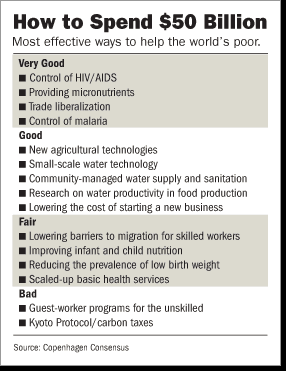June 12, 2005
How to Spend $50 Billion
An interesting list from WILLisms:
The Copenhagen SolutionThis is what makes politicians and environmentalists scurry away to find a dank hidey-hole -- an application of brains! Sure we can dump money into Kyoto but it will not have much of an effect and much much more can be done by focusing in other areas. There are places in India and China where the air pollution is so dense it's visible from space. The primary cause? Cooking fires. If we spent $5 per household for a cheap stove and delivered fuel oil to these villages, that would do a lot more for air pollution than staring like a deer in the headlights at CO2. H2O vapor is by far the worse greenhouse gas but since we cannot do anything about that, we sit mesmerized by the one we have some influence over. Posted by DaveH at June 12, 2005 7:35 PM
Why global warming should rank at the bottom of the world's priorities.
We're not sure what motivated Tony Blair's visit this week to the White House; he came to town with a losing hand--and played it. The British Prime Minister wants President Bush to commit the U.S. to billions in debt relief to the world's poorest countries through a mechanism called the International Finance Facility, which the Administration rightfully considers a nonstarter. Mr. Blair also wants the U.S. to sign on to his views on global warming. This is tilting at windmills in more ways than the Prime Minister may realize.
Instead, what Mr. Blair mainly got was a commitment from the Administration to release another $674 million in humanitarian relief--most of it food aid--for Africa, above the $3.2 billion per year it already provides. This is not nothing. By one estimate, the additional money will help feed 14 million people at risk of starvation in East Africa for a year. But if Messrs. Bush and Blair are to avoid falling out publicly at next month's G-8 Summit in Gleneagles, Scotland, they will need to do more than split their differences. A better approach to thinking about development is required.
Fortunately one exists, called the Copenhagen Consensus. The brainchild of Danish statistician Bjorn Lomborg, the Consensus is an attempt by leading economists (including three Nobelists) to set priorities for spending on development using traditional cost-benefit analysis. "We need to know what we should do first," says Mr. Lomborg. "Not being willing to prioritize does not make the problem go away: It simply becomes less clear--and, most likely, more expensive to solve in the end."
As an economist (MA), I wanted to mention that the "trade liberalization" argument is another ultra-simplification that has no actual merit.
Nobel laureates: there is a logical fallacy called " appeal to authority," in which a person with expertise in a field is cited uncritically. Nobel laureates in economics include a heavy concentration of University of Chicago ideologues who have lots of nice things to say about the financial sector (the Nobel Selection Committee is chosen by the Royal Bank of Sweden). These include economists who prostitute themselves to causes that are frankly evil: Gary Becker, who declared that the Pinochet Regime was "worth it" because it liberalized the Chilean economy; Fogel, whose book *Time on the Cross* essentially condemns the abolition of slavery (because it violated property rights) and so on.
When you're speaking of "trade liberalization," just be aware of the fact that this usually involves societies where property rights are very selectively enforced. For some reason, whenever this is pointed out, the speaker is accused of "waging class warfare."
Posted by: James R MacLean at June 13, 2005 2:18 AMSpeaking as a guy with a chemistry degree, the "H20 vapor" argument is a good indication that someone is stretching (or repeating someone else's stretched logic).
Regardless of where you stand on GW, the question is not "which molecule is worse." The question is "which molecules are in the atmosphere, and how are they changing over time."
The worst thing would be that in increase in CO2 could trigger a corresponding increase in H20 vapor, etc. In a complex system, this is certainly possible. We could consider the possiblity that a slight CO2 warming could cause more water evaporation, and more H20 vapor in a feedback loop.
Anyway, take as much time as you want to look at this ... but what out for people who feed you that kind of simplification.
Posted by: Mr. Chemistry at June 12, 2005 8:35 PM